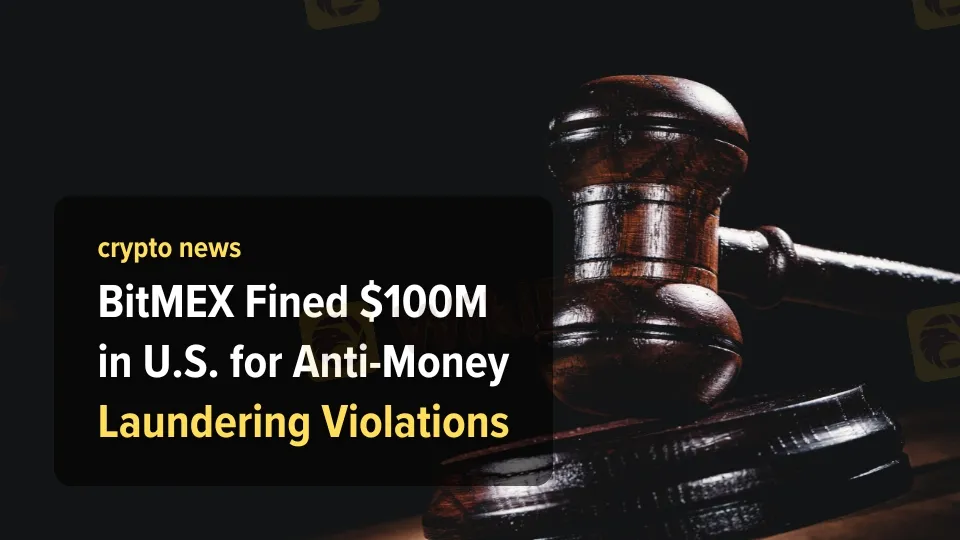简体中文
繁體中文
English
Pусский
日本語
ภาษาไทย
Tiếng Việt
Bahasa Indonesia
Español
हिन्दी
Filippiiniläinen
Français
Deutsch
Português
Türkçe
한국어
العربية
BitMEX Fined $100M in U.S. for Anti-Money-Laundering Violations
Abstract:BitMEX fined $100M for anti-money laundering and KYC violations. The case highlights the U.S. crackdown on crypto platforms ignoring Bank Secrecy Act rules.

Cryptocurrency exchange BitMEX has been hit with a $100 million fine by U.S. authorities for failing to comply with anti-money-laundering (AML) and know-your-customer (KYC) rules. The ruling, issued by a Manhattan federal court, also sentenced the exchange to two years of probation after it pleaded guilty to violating the Bank Secrecy Act (BSA).
While the fine is significant, its a far cry from the $417 million prosecutors originally pursued. The case spotlighted how BitMEX operated with a disregard for U.S. laws designed to prevent financial crimes, including money laundering.
What Went Wrong?
Prosecutors uncovered that BitMEX knowingly allowed U.S.-based customers to use its platform, despite regulations prohibiting this. Even after claiming to withdraw from the U.S. market in 2015, the Seychelles-based company implemented only weak measures to block American users. At the same time, its executives continued to promote the exchange at U.S. events.
Adding to the violations, BitMEX allegedly used a Hong Kong-based business as a pass-through for U.S. dollar transactions. Prosecutors said the company misled a Hong Kong bank about the nature of these activities.
“Todays sentence sends a clear message that companies that willfully violate these rules and refuse to implement AML/KYC programs will face consequences,” U.S. Attorney Matthew Podolsky said.

How BitMEX Responded
BitMEX addressed the ruling in a blog post, calling the charges “old news” and expressing disappointment about the penalty. However, the exchange acknowledged that the fine was far lower than the Justice Departments original demands.
The company also emphasized that it has been working to improve its AML and KYC protocols, even before the charges were brought against it. This effort is part of BitMEXs strategy to rebuild trust and ensure compliance with global regulations.
This isnt the first time BitMEX has faced consequences for its regulatory missteps. In 2021, the company agreed to pay $100 million to settle with U.S. regulators. In 2022, its three founders pleaded guilty to related criminal charges, each agreeing to pay $10 million in fines.
What This Means for the Crypto Industry
The BitMEX case highlights the growing pressure on cryptocurrency platforms to comply with financial regulations. With digital assets becoming more mainstream, governments worldwide are stepping up their efforts to ensure that exchanges have proper systems in place to prevent money laundering and other financial crimes.
Final Thought
The $100 million penalty is a wake-up call for the cryptocurrency industry. Its a clear reminder that compliance with AML and KYC regulations is not optional. For companies like BitMEX, failing to meet these standards risks not only hefty fines but also reputational damage. Moving forward, cryptocurrency exchanges must recognize that building trust with regulators and users alike is essential for long-term success in this evolving market.

Disclaimer:
The views in this article only represent the author's personal views, and do not constitute investment advice on this platform. This platform does not guarantee the accuracy, completeness and timeliness of the information in the article, and will not be liable for any loss caused by the use of or reliance on the information in the article.
Read more

First Unfair Trading Case Reported Under South Korea’s Virtual Asset User Protection Act
The Financial Services Commission (FSC) of South Korea has disclosed the first case of unfair trading following the enactment of the Virtual Asset User Protection Act. This law, which took effect in July 2024, aims to regulate the cryptocurrency market and protect investors from fraud and market manipulation.

Upbit Faces Severe Penalties for AML and KYC Violations
Upbit, South Korea’s leading cryptocurrency exchange, faces severe penalties for over 700,000 AML and KYC violations.

BSP Pushes for a Cashless Philippines by 2025
The BSP accelerates cashless transactions, aims for a coin-lite society, eliminates small fund transfer fees, and drives financial inclusion by 2025.

Maya Bank Disburses PHP 68B in Loans, Sets 2024 Record
Maya Bank disburses PHP 68B in loans in 2024, advancing financial inclusion with digital banking innovation, BSP compliance, and secure financial solutions.
WikiFX Broker
Latest News
How Long Can the Dollar Remain Strong?
Forex Price Trend Prediction! | Come be a New Year Price Winner!
HFM NY Special Offer!
How a Promised RM1.4 Million Return Turned into a Costly Scam
Cinkciarz.pl Under Fire: Frozen Accounts, Missing Funds
First Unfair Trading Case Reported Under South Korea’s Virtual Asset User Protection Act
“Predict and Win” Big Rewards! Join the Contest Now
"Jumped Deposit Scam": New Wave of Financial Fraud in India
South Korean President Yoon Suk Yeol's Arrest Shakes Markets
Titanium Capital LLC Ponzi Scheme: Henry Abdo Admits Fraud, Impacting Over 200 Investors
Currency Calculator






